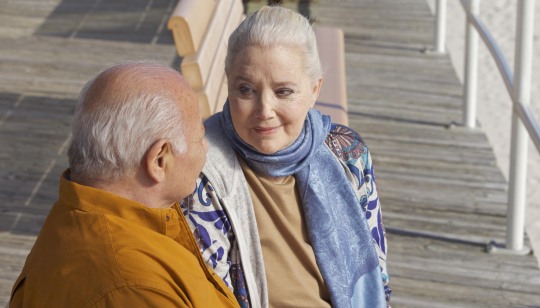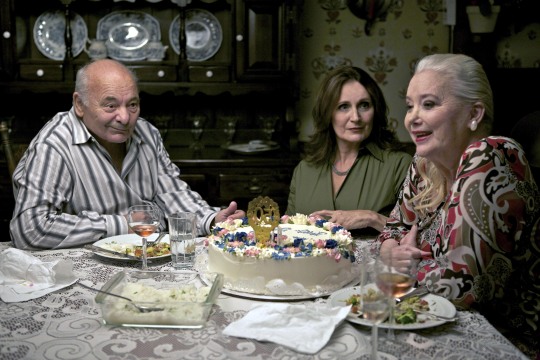Crafting Stories with Filmmaker Flavio Alves
“As an independent filmmaker, I have more freedom to take bold steps.”
Flavio Alves is an immigrant filmmaker living and working in New York. In 2014, Tom in America was the official selection of the Palm Springs International Film Festival and the Montreal World Film Festival. He sculpts narratives about the human experience while exploring the lives and relationships of characters from underrepresented communities.
Flavio’s first feature-length film, The Garden Left Behind is set to go into production this fall. The project is in the midst of a fundraising campaign, with the goal of raising 50K. You can support Flavio and The Garden Left Behind by making a tax-deductible contribution by clicking this link.
NYFA: After receiving political asylum in the United States in 1998 you enrolled in Columbia University and earned an undergraduate degree in political science. Why did you choose this discipline?
Flavio Alves (FA): First, I have to say that I am fascinated by American politics, but it was only after I entered college that I gave serious thought to majoring in political science. It was the best decision and investment of my career. Every course political science I took prepared me more to think critically and independently. It gave me the solid platform on which I stand on today.
NYFA: How did you begin working for then-Congressman Anthony Weiner (D-NY) and later for then-Senator Hillary Clinton (D-NY)? Why did you leave this work to study filmmaking?
FA: I started working for Anthony Weiner first as an intern at his district office in Queens, then he hired me to work on his first campaign for mayor of New York City (2004). I worked for him with LGBT issues and ran a supporting LGBT group called OUT FOR ANTHONY. After the campaign was over, I went to work for Hillary at her district office in Manhattan. It was a great experience working for both of them, but I never saw this type of work with politicians as something I wanted to do for the rest of my life. So, when the opportunity knocked on my door, I left everything behind to follow my passion: film. It was an incredible experience working for them. In fact, Anthony and I are still in contact and, by the way, he accepted to play a small part on my next film.
NYFA: How does your book Toque de Silencio (Call to Silence), which details your experiences as an openly gay man in the Brazilian navy, your Bachelor’s degree, and your role as Founder and Director of Asylum Research influence your creative work as a filmmaker and storyteller?
FA: I am very proud of every project I have done in the past, and all of them together helped me to become a better storyteller. The language of film is a uniquely powerful medium to engage audiences about important issues that we face. This has been the underlying theme of all of my work.

NYFA: When you immigrated, you left not only a geographic place, but human networks, friends and family. What is your relationship with your extended family?
FA: I have many friends and family members in Brazil and I am still in contact with them. In fact, social media has helped me to reunite with some of them.
NYFA: How do these connections influence the characters who drive your films?
FA: The characters in my films are always inspired by some flesh-and-blood people who I have met throughout my life. I don’t see frontiers when I work on a script but, unexpectedly, the story becomes an intimate portrait of a universal experience.
NYFA: Representations of love in popular culture are frequently focused on experiences about the young. Your work, however, focuses on elderly characters and takes care to show their complications. What sparks your interest depicting elderly characters?
FA: Seeing my grandmother getting older and losing her independence is one of my most vivid childhood memories. I wanted to do something about it. So when I came to America and became a filmmaker, I suddenly felt a massive weight of responsibility to discuss aging issues in my films. In the United States, but much less in Brazil, older people are overlooked and almost never depicted in films, except for very small roles. Today’s films are all about youth and their experiences. There are a lot prejudices faced by elderly people, and the reason is because we know very little about them, about their needs and struggles, so I hope my films will fill the gap and help to integrate the aging community with the rest of the population.
NYFA: In a behind the scenes video about your 2010 short, The Secret Friend, you mention the importance of the cast and crew’s contributions to the development of the film. How do you make decisions about whom you work with? How do you nurture this type of collaborative environment?
FA: Making a film is a roller-coaster ride and every crew and cast member must be ready to bring their best game. Yes, it’s important to have an experienced cinematographer and name actors attached, but when I interview someone I want to see how they are connected with the material, how they relate to the story and, more importantly, I want to know how excited they are to work on the project. Enthusiasm and passion are very important elements.
NYFA: What do you think about the role of shorts in the film industry and their value as a medium?
FA: If you are a first time filmmaker and you are planning to make a short film, don’t expect to get your money back, because it almost never happens. Try to make the best possible film. A short film should be seen as a calling card, which is a good way to show the kind of filmmaker you are, especially, if your short film [is accepted into] and wins awards at prestigious film festivals. When applying for grants, contacting investors, or even attaching a great cast and crew to your next film, your short film will give them a reason why they should take a chance on you.
NYFA: Your first feature film, The Garden Left Behind will go into production this fall. So far, what are the risks/rewards between making a short versus feature length film?
FA: I work on shorts as hard as I work on feature length films, and all my films go through the same process until I find distribution. However, the risks are much greater when you make a feature film because, since the costs are higher, we usually have investors attached. In other words, if you make a short film and it does not get anywhere, you can still make other shorts but, if you make a feature film and lose money, it could simply represent the end of your career as a filmmaker.
NYFA: The Garden Left Behind traces the relationship between Tina, a young trans woman, and her grandmother, Eliana. What do you think about the portrayal of trans characters by heterosexual performers in television and film? What questions of representation guide your work in directing and producing The Garden Left Behind?
FA: When you’re working with big studios, you face a huge pressure to ‘play safe’ when things come to story and casting. It’s very sad because, in many cases, minority groups are misrepresented. However, as an independent filmmaker, I have more freedom to take bold steps. In my upcoming film, The Garden Left Behind, in addition to educating our audience about challenges faced by the transgender community in general and transgender immigrants in particular, we plan to give roles to authentic transgender performers, rather than casting cisgender actors performing in drag. Similarly, we plan to cast Latino performers in Latino roles, and bilingual performers/native Spanish language-speakers in Spanish-speaking roles, in order to more authentically capture experiences from these specific walks of life.

NYFA: How did you learn about fiscal sponsorship and what role has NYFA’s Fiscal Sponsorship program played in your funding strategy for Tom in America and The Garden Left Behind?
FA: I heard about fiscal sponsorship while in film school, and I have been working with fiscal sponsors since then (for the past two films I made, I partnered with NYFA). If you know how they work, they will definitely enhance your ability as an artist to raise money. As a filmmaker, you have to try every resource you can think of and be very persistent. For each film I make I design a specific fundraising strategy, which is a combination of many tools available that will lead me to the money I need to keep making my films.
You can learn more about Flavio’s work on his website. Consider supporting The Garden Left Behind with a tax-deductible donation by clicking this link and choosing ‘Donate Now’.
– Interview by Madeleine Cutrona, Program Assistant Fiscal Sponsorship
Image credits, from above: John Flynn, Cara Howe, Cara Howe.





